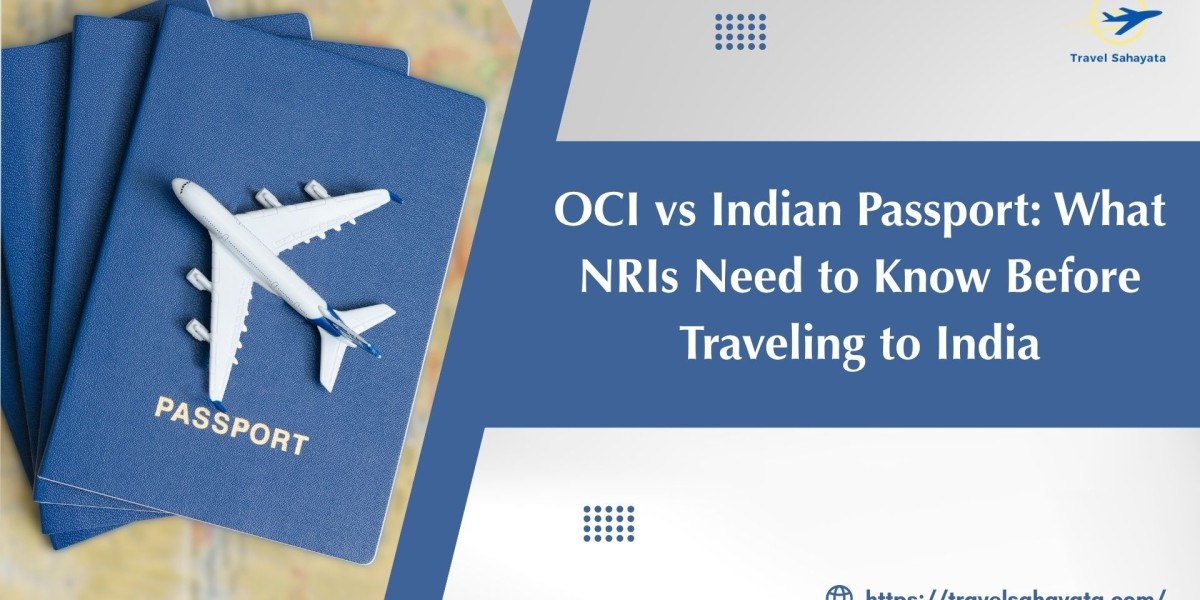For many Non-Resident Indians (NRIs), the decision to travel back to India involves navigating the complexities of travel documents. One of the most common areas of confusion is the difference between the Overseas Citizen of India (OCI) card and an Indian passport. If you’re an NRI planning a trip to India, especially for business, family commitments, or legal purposes, it’s essential to understand which document applies to your situation and what rights and restrictions each one entails.
This blog will help you understand the key differences between an OCI and an Indian passport, who qualifies for each, and how these documents affect your ability to travel, live, work, and conduct business in India.
What is an Indian Passport?
An Indian passport is a travel document issued to Indian citizens by the Government of India. It serves as proof of Indian nationality and is required for any international travel. Holding an Indian passport means:
You are an Indian citizen under Indian law.
You can vote in Indian elections.
You can own agricultural property in India.
You can work and conduct business in India without restrictions.
You can travel to other countries with visa-on-arrival or e-visa facilities available to Indian citizens.
What is an OCI (Overseas Citizen of India)?
The OCI card is not a passport. It is a long-term visa issued to foreign nationals of Indian origin, allowing them to enter and reside in India without requiring a visa each time. The OCI is essentially a bridge between India and its global diaspora. With an OCI, you are not an Indian citizen, but you are granted many privileges:
Lifetime visa-free travel to India.
Permission to stay in India for any length of time.
Exemption from registering with the Foreigners Regional Registration Office (FRRO) for stays longer than 180 days.
Eligibility to own non-agricultural property in India.
The right to open a business in India under certain conditions.
However, OCI holders cannot:
Vote in Indian elections.
Hold a government job in India.
Own agricultural land.
Hold an Indian passport.
Key Differences: OCI vs Indian Passport
Feature | Indian Passport | OCI Card |
Citizenship | Indian | Not a citizen |
Voting Rights | Yes | No |
Property Ownership | All types | No agricultural land |
Government Jobs | Eligible | Not eligible |
Passport Type | Indian | Foreign |
Visa Requirement to India | Not applicable | Visa-free lifetime entry |
Validity | 10 years (renewable) | Lifetime (must update with new passport age-wise) |
Business Rights | Full business access | Allowed under FDI guidelines |
Who Should Have What?
1. If You're an Indian Citizen Living Abroad
If you’ve not taken citizenship in another country, you retain your Indian passport and full rights in India. You are considered an NRI, not an OCI. You can travel to and from India freely, vote in Indian elections, and run your own business in India.
2. If You've Taken Foreign Citizenship
You must surrender your Indian passport and apply for an OCI card. Once you have the OCI, you can still travel and live in India easily but will face some limitations. For instance, while you can start a business or invest in one, you must follow Foreign Direct Investment (FDI) guidelines and are not permitted to vote.
Business Travel Considerations for NRIs
Whether you hold an Indian passport or an OCI card, traveling to India for business involves different levels of access and permissions.
Indian Passport Holders: You can register a company, open a bank account, and operate a business in India without foreign investment restrictions. This is especially beneficial for those with frequent business dealings in India.
OCI Card Holders: You can also start and manage businesses in India, but you must follow FDI norms. While the restrictions are minimal for many sectors, areas like defense, media, and agriculture may have limitations.
Travel Rules & Entry Requirements
For Indian Passport Holders:
Must carry a valid Indian passport and any required visas for the destination country.
No visa is needed to enter India.
For OCI Holders:
Must carry both the OCI card and the foreign passport.
If your OCI card was issued before you turned 20 or after 50, you must reissue the card when your passport is renewed.
Entry into India is visa-free, but OCI-related services are managed via embassy channels, and some processing may take time.
How to Get an OCI Card
To obtain an OCI card, you must:
Have a foreign passport.
Provide proof of your Indian origin (such as your previous Indian passport, your parents’ or grandparents’ Indian passports or documents).
Apply through the Indian embassy or official partner portals.
Submit required documents like photos, ID proof, and a copy of the surrendered Indian passport (if applicable).
For smooth processing, many NRIs prefer using support services like TravelSahayata, which help with document verification, appointment scheduling, and tracking applications.
Conclusion
Choosing between an Indian passport and an OCI card isn’t always about preference—it’s about eligibility. If you’re still an Indian citizen, your Indian passport gives you full rights, including the freedom to live, work, and do business in India. However, once you’ve become a citizen of another country, the OCI card is your best option for maintaining a strong connection with India.
Whether you’re returning for personal reasons or important business, knowing which document you hold—and what it allows—ensures that your plans go smoothly. TravelSahayata can be a helpful companion through this process, especially for NRIs who want assistance with documentation or are planning frequent visits to India for work or entrepreneurship.




